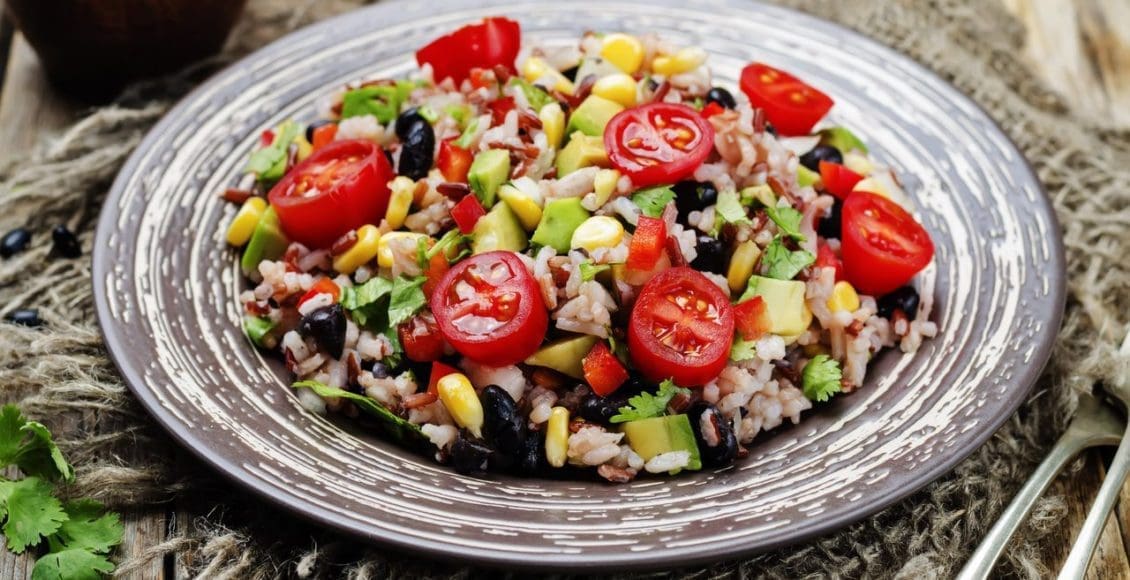Do you ever eat a healthy lunch only to find yourself starving by 3 p.m.? You’re not alone. This a common frustration I hear from my clients, and in most cases, the explanation is the same: The meal was missing at least one key element that plays a major role in satiety, satisfaction, and energy. Luckily there’s an easy fix: Use my simple formula for crafting meals that stave off hunger—but don’t leave you feeling over-stuffed or sluggish. I’ve also included five simple examples that fit the bill below.
Table of Contents
1. Add fiber-rich veggies
I highly recommend working veggies into every meal (even breakfast!). They’re nutritious, full of antioxidants, provide very few calories per portion, and are packed with fiber—which is filling because it takes up space in your digestive system. Fiber also slows digestion, which means you’ll have a steadier supply of energy over a longer period of time.
For breakfast, veggies can be added to an omelet, whipped into a smoothie, or eaten as a side. Many of my clients even enjoy salad at breakfast (dressed with citrus vinaigrette), or a serving of raw veggies that act as a palate cleanser at the end of the meal. All veggies provide some fiber, but a few top sources include artichokes, broccoli, Brussels sprouts, cauliflower, and kale.
RELATED: What is Clean Eating?
2. Choose lean protein
Aside from boosting metabolism, lean protein also wards off hunger better than carbs and fat, according to research. Be sure to include a lean source (think eggs, seafood, poultry, or Greek yogurt) in each meal. If you’re vegan, reach for pulses—the umbrella term for lentils, beans, and peas, like chickpeas and black eyed peas.
3. Don’t forget a plant-based fat
There’s no doubt about it: Fat is satiating. If you’ve ever eaten a salad with fat-free dressing versus one with olive oil, you’ve experienced the difference. Plus, the notion that eating fat makes you fat is seriously outdated. I tell my clients to include a healthy source in every meal. My favorites are avocados, nuts and seed (including ground-up versions like almond butter and tahini), extra virgin olive oil, Mediterranean olives, olive tapenade, and pestos made with EVOO and nuts or seeds.
RELATED: 13 Healthy High-Fat Foods You Should Eat More
4. Toss in a “good” carb
By now you probably know that eating a low-fat blueberry muffin for breakfast isn’t exactly good for you. But did you realize it will likely leave your stomach grumbling an hour later despite the whopping 400 calorie count? That’s because refined carbs and sugar cause a spurge in blood glucose that triggers a quick insulin response; the insulin spike then results in a drop in blood sugar, which means the return of hunger pangs.
But, that doesn’t mean you need to nix carbs altogether. Just opt for a small portion of a fiber-packed, whole food source. Good choices include whole grains like oats or quinoa, starchy veggies like skin-on potatoes and squash, fresh fruit, and pulses.
Start with a small serving—around half a cup (or the size of half a tennis ball)—and up your intake depending on your body’s fuel needs. In other words, if you spend most of your hours sitting at a desk, a half cup is probably fine. But if you have an active day ahead, bump up the carbs a bit.
5. Be generous with herbs and spices
Natural herbs and spices are another category of satiety enhancers. I’m talking fresh or dried basil, cilantro, oregano, rosemary, garlic, ginger, cinnamon, turmeric, cumin, zest, and pepper. Even vinegars like balsamic, and hot peppers like chili or jalapeno, count. Use them to add aroma and flavor, and raise your satisfaction level at each meal.
RELATED: You Should Probably Be Eating More Turmeric. Here’s How
Now you may be wondering what a “complete” meal that follows all five rules would actually look like. If so, here are five examples of easy, stick-to-your-ribs, energizing dishes:
Veggie scramble
Sauté Brussels sprouts in low-sodium vegetable broth, along with more of your favorite veggies like onion and grape tomatoes, along with seasonings, such as a dried Italian herb mix, turmeric, and black pepper. Add one whole egg and three to four whites or one whole egg and three quarters cup whites to scramble. Serve over a half-cup of lentils, topped with half of a sliced avocado.
Turkey veggie stir-fry
Brown about four ounces of extra-lean ground turkey and set aside. Sauté broccoli florets and other veggie faves like bell pepper and mushrooms in low-sodium vegetable broth with minced garlic, fresh grated ginger, and minced chili pepper. Add the turkey back in to re-heat, serve over a small scoop of brown or wild rice, and top with sliced almonds.
Wild tuna salad
Mix canned wild tuna with herbed olive tapenade. Serve over a bed of greens and veggies, topped with cooked, chilled quinoa.
RELATED: How to Buy Healthy Food Without Looking at the Nutrition Label
Chilled egg salad
Toss a handful of minced kale with a chopped hard boiled egg and three whites. Fold in a tablespoon of dairy-free pesto and mix with a half cup of chickpeas.
Black bean and veggie platter
Sauté cauliflower and spinach in low-sodium vegetable broth, seasoned with minced garlic and fresh cilantro. Serve with small scoops of black beans and brown rice, topped with a dollop of guacamole and wedges of fresh lime.
Cynthia Sass is Health’s contributing nutrition editor, a New York Times best-selling author, and consultant for the New York Yankees. See her full bio here.

Post Disclaimer
Professional Scope of Practice *
The information on this blog site is not intended to replace a one-on-one relationship with a qualified healthcare professional or licensed physician and is not medical advice. We encourage you to make healthcare decisions based on your research and partnership with a qualified healthcare professional.
Blog Information & Scope Discussions
Welcome to El Paso's Premier Wellness and Injury Care Clinic & Wellness Blog, where Dr. Alex Jimenez, DC, FNP-C, a board-certified Family Practice Nurse Practitioner (FNP-BC) and Chiropractor (DC), presents insights on how our team is dedicated to holistic healing and personalized care. Our practice aligns with evidence-based treatment protocols inspired by integrative medicine principles, similar to those found on this site and our family practice-based chiromed.com site, focusing on restoring health naturally for patients of all ages.
Our areas of chiropractic practice include Wellness & Nutrition, Chronic Pain, Personal Injury, Auto Accident Care, Work Injuries, Back Injury, Low Back Pain, Neck Pain, Migraine Headaches, Sports Injuries, Severe Sciatica, Scoliosis, Complex Herniated Discs, Fibromyalgia, Chronic Pain, Complex Injuries, Stress Management, Functional Medicine Treatments, and in-scope care protocols.
Our information scope is limited to chiropractic, musculoskeletal, physical medicine, wellness, contributing etiological viscerosomatic disturbances within clinical presentations, associated somato-visceral reflex clinical dynamics, subluxation complexes, sensitive health issues, and functional medicine articles, topics, and discussions.
We provide and present clinical collaboration with specialists from various disciplines. Each specialist is governed by their professional scope of practice and their jurisdiction of licensure. We use functional health & wellness protocols to treat and support care for the injuries or disorders of the musculoskeletal system.
Our videos, posts, topics, subjects, and insights cover clinical matters and issues that relate to and directly or indirectly support our clinical scope of practice.*
Our office has made a reasonable effort to provide supportive citations and has identified relevant research studies that support our posts. We provide copies of supporting research studies available to regulatory boards and the public upon request.
We understand that we cover matters that require an additional explanation of how they may assist in a particular care plan or treatment protocol; therefore, to discuss the subject matter above further, please feel free to ask Dr. Alex Jimenez, DC, APRN, FNP-BC, or contact us at 915-850-0900.
We are here to help you and your family.
Blessings
Dr. Alex Jimenez DC, MSACP, APRN, FNP-BC*, CCST, IFMCP, CFMP, ATN
email: coach@elpasofunctionalmedicine.com
Licensed as a Doctor of Chiropractic (DC) in Texas & New Mexico*
Texas DC License # TX5807
New Mexico DC License # NM-DC2182
Licensed as a Registered Nurse (RN*) in Texas & Multistate
Texas RN License # 1191402
ANCC FNP-BC: Board Certified Nurse Practitioner*
Compact Status: Multi-State License: Authorized to Practice in 40 States*
Graduate with Honors: ICHS: MSN-FNP (Family Nurse Practitioner Program)
Degree Granted. Master's in Family Practice MSN Diploma (Cum Laude)
Dr. Alex Jimenez, DC, APRN, FNP-BC*, CFMP, IFMCP, ATN, CCST
My Digital Business Card


